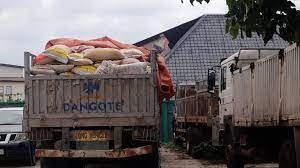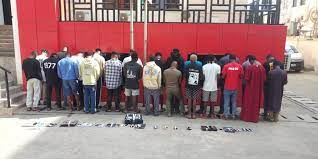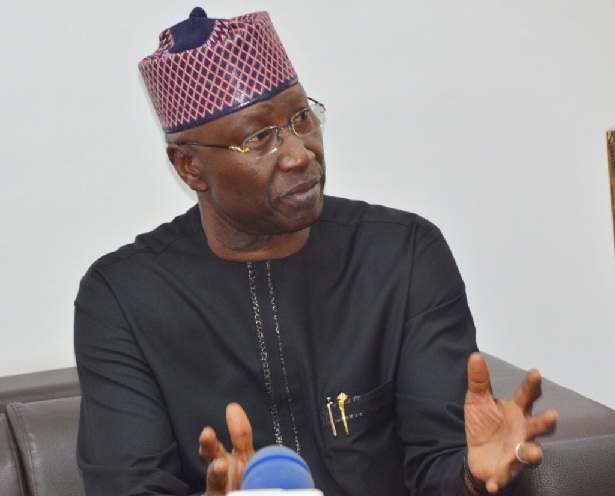Business News
Buhari, Five African Leaders Inaugurate 650,000bpd Dangote Refinery in Style
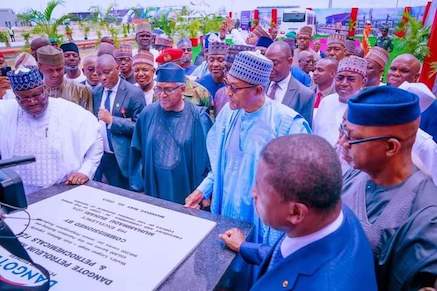
By Mathew Dadiya, Abuja
Five African Heads of State, yesterday joined President Muhammadu Buhari, to inaugurate Dangote Petroleum Refinery in Ibeju-Lekki, Lagos with a refining capacity of 650,000 barrels per day, which is expected to enable Nigeria to achieve self-sufficiency in refined products and even have a surplus for export.
The African leaders, who attended the inauguration ceremony, were Nana Akufo-Addo of Ghana, Faure Gnassingbe of Togo, Mohamed Bazoum of Niger, Macky Sall of Senegal and a representative of the President of Chad.
Speaking at the event, President Buhari described the feat as a significant milestone for Nigeria’s economy and a game changer for the downstream petroleum products market in the entire African region.
“This mega industry we are commissioning today is a clear example of what can be achieved when entrepreneurs are encouraged and supported and when an enabling environment is created for investments and for businesses to thrive.
“I am confident that my successor, His Excellency Asiwaju Bola Ahmed Tinubu, will sustain the improvement in our economic and business environment and strengthen the framework of our public-private partnership policies to accelerate the pace of our economic growth and development.
“I am happy to leave our economy in very competent hands,” he said.
Buhari who commended Aliko Dangote’s leadership in executing the 650,000 barrels per day refinery urged other entrepreneurs to emulate his example in driving economic growth and realizing Nigeria’s economic potential.
He stressed the need for African countries to come together, integrate their economies, eliminate trade barriers, and rally their populations to achieve Agenda 2063 for the continent’s prosperity.
“I urge and encourage our other great entrepreneurs to emulate this iconic Nigerian industrialist and join the Government in accelerating our growth to realize our country’s globally recognized economic potential.
“When I travel around Africa and meet and engage my brother Heads of State (and I am delighted some of their Excellences are here) I often sense a quiet expectation that our country is blessed with resources and human capacity to lead Africa’s rise to economic prosperity and the attainment of Agenda 2063 – ‘The Africa we all want.’
“But to achieve the goals of Agenda 2063, Africa must come together – we must integrate our economies, eliminate trade barriers and energize our youthful population to scale up our production capacity.
“We must create necessary conditions for our private sector to grow and partner with the public sector to accelerate economic growth across the continent.
“We must not allow outside powers to use some of our leaders to destabilize our economic and political trajectory,” he said.
Buhari acknowledged the visionary investments made by the Dangote Group, under the leadership of Dangote, in transforming Nigeria’s economy through its involvement in critical industries such as cement and fertilizer.
He noted that investment in these sectors has played a crucial role in shifting Nigeria from heavy import dependence to becoming a net exporter.
Buhari acknowledged that Nigeria’s economy has faced significant challenges over the years, including deficits in economic infrastructure, insurgency, and external crises such as the Global Financial Crisis, oil price collapses, the COVID-19 pandemic, and the Russia-Ukraine war.
“The consequence of these challenges constitutes a severe strain on our economy, limiting Government’s ability to provide basic infrastructure without resorting to huge borrowings.
“Our Government, therefore, took the decision to focus attention on creating an enabling environment for the private sector to thrive and fill the enormous gap in investments not only in infrastructure but also in all critical sectors.
“We recognize that without the active participation of the private sector and a strong commitment to public-private partnership, our economy would continue to remain severely challenged and our economic growth impeded.
“Government, therefore, will and should continue to provide an enabling environment and encourage innovative public-private partnerships in all sectors of our economy,” Buhari said.
The President emphasized the administration’s commitment to this approach, citing Executive Order 007 of 2019 which facilitated the rehabilitation/construction of many roads by private sector investors using a Tax-credit scheme.
“It is my hope that the succeeding Administration will continue to apply such innovative schemes in partnership with the private sector to accelerate the provision of critical infrastructure in particular roads, power and gas pipelines,” he added.
Aliko Dangote emphasised the refinery’s role in fulfilling the group’s corporate vision of promoting self-sufficiency and global competitiveness.
“We have built a Refinery with a capacity to process 650,000 barrels per day (plus 900,000 tonnes of polypropylene) in a single train – which is the largest in the world. We have selected the best plants and equipment and the latest technologies from across the world.
“Our products slate is designed to meet the highest quality standards and high-value products including Premium Motor Spirit (PMS), Automotive Gas Oil (Diesel), Aviation Turbine Kerosine (ATK); all of Euro V Standards that will enable us not only meet our Country’s demand but also to become a key player in the African and global market.
“Our coastal location and offshore loading and offloading (SPM) facilities with a capacity to receive all our crude oil supplies and evacuate up to 75% of our liquid products give us direct access to the rest of Africa and the global market for exports. In addition, 80 percent of our production can be discharged through trucks nationwide.”
He disclosed that the huge investment of over $18.5billion in this industry was prompted by the company’s desire to support and contribute its quota to the Federal Government’s sustained effort to transform the economy and reposition Nigeria as the leading nation in Africa, and a respected member among emerging economies in the world.
According to him, apart from ensuring a consistent supply of high-quality fuels for the transportation sector, the refinery will provide essential raw materials to a wide range of manufacturing sectors, including plastics, pharmaceuticals, food and beverages, packaging, construction, and more.
He further stated that the refinery’s operation and related businesses would generate a substantial number of job opportunities, while the downstream supply and distribution of its products would significantly contribute to the absorption of labor, potentially benefiting hundreds of thousands of individuals.
“’Once our plant is fully on stream, we expect that at least 40% of the capacity will be available for export and this will result in significant Foreign Exchange inflows into the country.
Overall, we are committed to operating our Plant in line with international best practice requirements, recognizing the importance of protecting the environment, and putting in place stringent environmental, health, and safety policies to ensure that the Refinery operates in a safe and sustainable manner,” he said.
Facts You Need to Know About the Refinery.
The Dangote Refinery and Petrochical Company Limited commissioned yesterday with fanfare by President Muhammadu Buhari is the largest single Train refinery in the World. It has 650,00bpd refinery capacity and was built at the total cost of about $18.5bn.
Out of the amount, Dangote contributed $9bn equity, while the balance was provided by a consortium of Nigerian banks and Africa Export Import ( AFREXIM) bank under various lending terms
It is situated on 2,635 hectaresof land, an area said to be seven times bigger than the size of Victoria Island part of Lagos.
Before Commencement of construction, the company dredged 65m cubic meters of sand at a cost of 300million euros.
The complex has a 435MW Power plant, with a 10m ton per year Granite quarry. The refinery completed its own port with two quays both with a load bearing capacity of 25tons/sqm and has potential to be increased to 6. It also has 177 tanks with a bearing capacity of 4.7b litres. Dangote Group purchased 332 cranes for the project, which were used for loading, off loading and installations at the complex.
The construction phase involved 150,000 local technicians/engineers, 200 Nigerian contractors directly while the operational phase will employ over 30,000 directly excluding at least 45 service contractors from different fields.
The .construction entailed the use of 3,000KM pipeline network
while over 2,700 installations took place.
The Complex has a housing estate that could accommodate 40,000 staff according to the Central Bank of Nigeria(CBN), could generate up $11bn in foreign exchange annually and could stabilise the nation’s foreign exchange system..
The refinery hopes to supply 100 per cent of the fuel needs of Nigeria and targets 40 per cent of its production for exports.
By its conception, the refinery refine all crude types from Africa, Asia and America.
Business News
Adaora Umeoji Showcases Zenith Bank’s Strong Financial Performance, Targets Over N1 Trillion Profit In 2024

Zenith Bank Plc, Nigeria’s leading financial institution, held its Capital Markets Day last week to showcase the bank’s inherent values as it embarks on its recapitalisation journey. The event, which brought together key market players, focused on the bank’s growth trajectory, strategic objectives, market performance, and consistent, robust dividend payout over the years.
It also provided an opportunity for the bank to inform capital market stakeholders about its robust risk management culture, adherence to regulations, capital adequacy, and maintenance of low non-performing loan levels.Addressing capital market stakeholders, investors, and analysts at the event in Lagos, the Group Managing Director/Chief Executive Officer, Dame Dr Adaora Umeoji, highlighted the financial institution’s tier-1 capital of N1.
8 trillion, shareholders’ funds of N2.3 trillion, market capitalisation of N1.3 trillion, a profit before tax of N796 billion, and a dividend of N4 per share for the year ended December 2023.Providing guidance for 2024, she noted that, given the trend of the bank’s performance and having achieved a profit before tax of N796 billion in 2023 and N320 billion in the first quarter of 2024, the bank is on track to deliver over N1 trillion in profit before tax in 2024. She expressed confidence that, with the quality of the board and management and a strong corporate culture, the bank is well-positioned to deliver superior value to investors and other stakeholders and to navigate the recapitalisation process successfully. She also disclosed some of the bank’s future plans, which include driving financial inclusion, expanding corporate and retail banking through technology and other state-of-the-art digital platforms, and establishing a fintech subsidiary, ZenPay, to drive profitability. Additionally, the bank intends to expand to France and other Francophone African countries.
Dr Umeoji explained, “For us at Zenith, we won’t be left out. We are planning to go to the market to raise capital, and as it stands, Zenith Bank has the least amount of capital to raise. We are looking to raise N230 billion because we are already at N270.7 billion. That is the least capital to raise among our peers. We believe that Zenith Bank has what it takes. We have the capacity, the network, the balance sheet, the human capital, and the track record to achieve that. We are planning for the future, and the technology we have now is the best in the entire industry. It will help us to have a seamless process and integrate.”
Also speaking, the Chief Financial Officer/General Manager, Dr Mukhtar Adam, pointed out that in the last five years, the bank’s Compound Annual Growth Rate (CAGR) in revenue has grown by over 27 per cent. “This continues to grow year-on-year. Within this period, at some point, Nigeria went into recession, but we forged ahead, worked very hard, and continued to deliver growth. Within the last five years, our profit before tax has also grown cumulatively by about 28 per cent. This is a market where, at some point, government instruments – treasury bills – were paying one per cent, two per cent, three per cent. But we forged ahead to grow the numbers and provide stable returns of at least 28 per cent.”
Zenith Bank recently emerged as the Best Commercial Bank, Nigeria, in the World Finance Banking Awards 2024, retaining the award for the fourth consecutive year. The bank was also named Best Corporate Governance, Nigeria, for the third year running in the World Finance Corporate Governance Awards 2024. The awards, published in the Summer 2024 issue of World Finance Magazine, recognise the bank’s robust financial performance, superior customer service, sustainability initiatives, and corporate governance practices.
Commenting on the dual honours, Dr. Umeoji said, “These awards highlight our steadfast dedication to excellence, adherence to global best practices, and our persistent effort to deliver superior value to all stakeholders through innovative products and services. Receiving these awards consecutively for multiple years signifies the commitment of our staff, the loyalty of our customers, and the support of our shareholders. We remain devoted to setting industry benchmarks and driving excellence across all aspects of our operations.”
Dr. Umeoji also expressed delight at the recognition and dedicated the awards to the Founder and Chairman, Dr. Jim Ovia, CFR, for his impactful leadership in establishing a robust and flourishing institution. She also expressed gratitude to the board for their vision and insight, the staff for their unwavering dedication, and the bank’s customers for choosing Zenith as their preferred bank. World Finance is a leading international magazine providing comprehensive coverage and analysis of the financial industry, international business, and the global economy.
In its audited results for the year ended December 31, 2023, Zenith Bank achieved a remarkable triple-digit growth of 125 per cent in gross earnings, from N945.6 billion reported in 2022 to N2.132 trillion in 2023. The impressive growth in gross earnings resulted in a year-on-year increase of 180 per cent in profit before tax (PBT), from N284.7 billion in 2022 to N796 billion in 2023, while profit after tax (PAT) also recorded triple-digit growth of 202 per cent, from N223.9 billion to N676.9 billion for the period ended December 31, 2023.
The increase in gross earnings was primarily due to growth in interest and non-interest income. Specifically, its interest income increased by 112 per cent, from N540 billion in 2022 to N1.1 trillion in 2023, while non-interest income grew by 141 per cent, from N381 billion to N918.9 billion in the same period. The rise in interest income was attributed to the growth in the size of risk assets and their effective repricing, alongside the increase in yield of other interest-bearing instruments over the year. Growth in non-interest income was driven by significant trading gains and an increase in gains from the revaluation of foreign currencies.
Zenith Bank’s cost of funds also grew from 1.9 per cent in 2022 to three per cent in 2023 due to the high interest rate environment, while interest expense increased by 135 per cent, from N173.5 billion in 2022 to N408.5 billion in 2023. Notwithstanding the 32 per cent growth in operating expenses in 2023, the Group’s cost-to-income ratio improved significantly from 54.4 per cent in 2022 to 36.1 per cent in 2023 due to improved top-line performance. Return on Average Equity (ROAE) increased by 118 per cent, from 16.8 per cent in 2022 to 36.6 per cent in 2023, underpinned by improved gross earnings, as the Group sought to deliver better shareholder returns. Return on Average Assets (ROAA) also grew by 95 per cent, from 2.1 per cent to 4.1 per cent in the same period.
Zenith Bank was established in May 1990 and commenced operations in July of the same year as a commercial bank. The bank became a public limited company on June 17, 2004, and was listed on the Nigerian Stock Exchange (NSE) on October 21, 2004, following a highly successful Initial Public Offering (IPO). In 2013, the bank listed $850 million worth of its shares at $6.80 each on the London Stock Exchange (LSE). Headquartered in Lagos, Nigeria, Zenith Bank Plc has more than 400 branches and business offices in prime commercial centres across all states of the federation and the Federal Capital Territory (FCT).
Zenith Bank Plc, founded by Jim Ovia, CFR, in 1990, has since grown to become one of the leading financial institutions in Africa. The underlying philosophy is for the bank to remain a customer-centric institution with a clear understanding of its market and environment. Zenith Bank’s track record of excellent performance has continued to earn the brand numerous awards. These latest accolades follow several recognitions, including being recognised as the Number One Bank in Nigeria by Tier-1 Capital for the 14th consecutive year in the 2023 Top 1000 World Banks Ranking, published by The Banker Magazine; Bank of the Year (Nigeria) in The Banker’s Bank of the Year Awards for 2020 and 2022; and Most Sustainable Bank, Nigeria, in the International Banker 2024 Banking Awards, among several others.
Zenith Bank Plc has blazed the trail in digital banking in Nigeria, achieving several firsts in the deployment of Information and Communication Technology (ICT) infrastructure to create innovative products that meet the needs of its customers. The bank is a leader in the deployment of various channels of banking technology, and the Zenith brand has become synonymous with state-of-the-art technologies in banking. Driven by a culture of excellence and strict adherence to global best practices, the bank has combined vision, skilful banking expertise, and cutting-edge technology to create products and services that anticipate and meet customers’ expectations, enable businesses to thrive, and grow wealth for customers.
Business News
AMCON Records Over N108bn in 2023 Financial Year
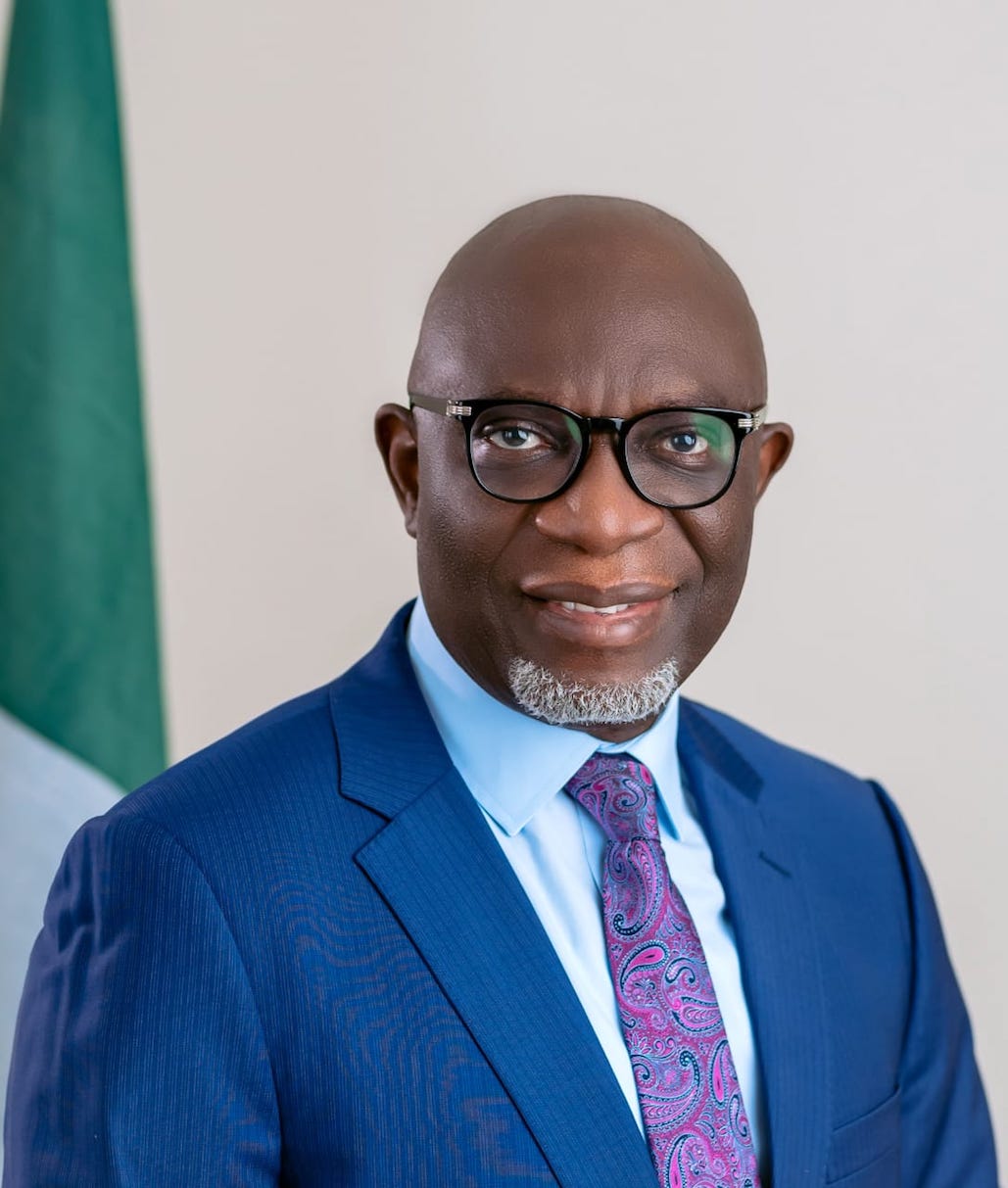
By Tony Obiechina, Abuja
Amidst challenging macroeconomic conditions coupled with economic headwinds, Asset Management Corporation of Nigeria (AMCON) achieved a remarkable triple-digit growth of 202% from NGN34.730 billion in the previous year to NGN108.433 billion in 2023.
This was contained in the a statement made available by Jude Nwauzor, Head of Corporate Affairs Department in Abuja on Wednesday.
A breakdown of this impressive achievement showed that AMCON, which is currently led by Gbenga Alade as Managing Director/Chief Executive Officer achieved a Year-on-Year (YoY) growth in profit of 212% from N34.730 billion in the financial year, which ended on December 31, 2022, to N108.
433 billion in the period ended December 31, 2023.The report disclosed that fair valuation gains on Eligible Bank Assets (EBAs) increased to N40.9 billion in 2023 from a loss of N187.9 billion in 2022. Equity portfolio recorded 82% growth in 2023 amounting to N43 billion as compared with N7.9 billion in 2022. The significant trading gains is as result of an improved performance in the stock market.
The Corporation achieved a favourable reduction in total liabilities, from N6.282 trillion in 2022 to N5.739 trillion in 2023, primarily due to repayments of the N500 billion Central Bank of Nigeria (CBN) loan. It also recorded 89% achievement of its revenue budget in 2023 as the total recovery in 2023 stood at N125.2 billion.
A breakdown of the recovery showed that AMCON achieved N81.65 billion in collections from various obligors, N17.8 billion from share sales, N15.5billion reinvestment income, N6 billion as proceed from sale of properties, N3.8 billion dividend income and N0.5 billion from rental income despite the country’s challenging economic environment, occasioned by the removal of subsidy and floatation of the naira.
The executive management said AMCON is strategically positioned to continue with the positive trajectory achieved in the year 2023, with special emphasis on improved recoveries and efficient realization of value from disposal of forfeited assets in furtherance of the Corporation’s mandate.
The summary of the AMCON’s Financial highlight is presented below:
*Profit for the year Dec 31, 2022 – N34,730bn
*Profit for the year Dec 31, 2023 – N108,433bn
*Total comprehensive income for the year, net of tax – (2023) N106,385bn
N30,963bn (2022)
Total Assets
N1,076,144bn (2023)
N1,513,304bn (2022).

Recapitalization ‘ll Create Stronger, more Resilient Banks – Cardoso
By Tony Obiechina, Abuja
The Governor of the Central Bank of Nigeria (CBN), Mr. Olayemi Cardoso, has said that the Bank will continue to collaborate with relevant financial institutions, the fiscal authorities and the National Assembly to ensure a successful recapitalisation exercise, including providing adequate protection of property rights and interests of minority shareholders.
Mr. Cardoso made the pledge in London on while speaking to stakeholders on “The Impact of the Recapitalization of Nigerian Banks” at the UK-Nigerian Chamber of Commerce.
The Governor, represented by the Bank’s Deputy Governor, Financial Systems Stability, Mr. Phillip Ikeazor, emphasised the event’s significance and restated the CBN’s commitment to fostering stronger, healthier, and more resilient banks capable of withstanding economic shocks and supporting the Government’s goal of achieving a GDP of US$1 trillion by 2030.
According to him, the anticipated impact of the recapitalisation programme will include an increase in banks’ lending capacity, a boost in the volume of foreign direct investment (FDI), and an increase in foreign exchange liquidity.
He said the exercise would also contribute to GDP growth, better risk management, improved credit ratings, a diversified ownership base, better governance and strategic decisions, and increased market volume and value, leading to a more vibrant equity market.
“With the recapitalisation programme, our goal is to trigger the emergence of stronger, healthier and more resilient banks,” he added.
He noted that several factors influenced the new minimum capital requirements, including macroeconomic conditions, stress test outcomes, and the need for improved risk management.
“We will rigorously enforce our “fit and proper criteria” for prospective new shareholders, senior management, and board members of banks, and proactively monitor the integrity of financial statements, adequacy of financial resources, and fair valuation of banks’ post-merger balance sheets,” Cardoso assured.
He noted the significant opportunity it presents to engage investors, policymakers, and technocrats on the critical issue of bank recapitalisation in Nigeria.
Mr Cardoso explained that since assuming of office in October 2023, his priorities at the CBN have included achieving monetary and price stability, maintaining a stable exchange rate, controlling inflation, and creating an enabling environment for businesses.
He explained that the recapitalisation directive excluded retained earnings from the minimum capital requirement to simplify capital calculations and enhance transparency. He explained that the decision, rooted in the BOFIA Act 2020, aligns with international standards like Basel III and emphasises core capital elements to improve financial stability.
Reflecting on the successful 2004/5 Banking Sector Reforms, which consolidated the industry, increased capital bases, and boosted resilience against the global financial crisis, the Governor assured that the current recapitalisation initiative aims to build on these achievements.


